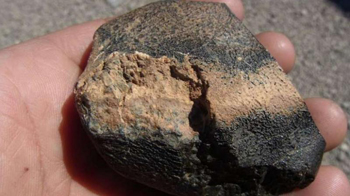Feb 3: Scientists have uncovered evidence of at least two billion years of volcanic activity on Mars, after analysing a meteorite from the red planet.
 The finding confirms that some of the longest-lived volcanoes in the solar system may be found on the red planet.
The finding confirms that some of the longest-lived volcanoes in the solar system may be found on the red planet.
Shield volcanoes and lava plains formed from lava flowing over long distances, similar to the formation of the Hawaiian Islands.
The largest Martian volcano, Olympus Mons, is nearly 27.3 kilometres high. That is almost triple the height of Earth's tallest volcano, Mauna Kea, at 10 kilometres.
The findings offer new clues to how the planet evolved and insight into the history of volcanic activity on Mars, said
Tom Lapen, a professor at the University of Houston in the US.
Much of what we know about the composition of rocks from volcanoes on Mars comes from meteorites found on Earth.
Analysis of different substances provides information about the age of the meteorite, its magma source, length of time in space and how long the meteorite was on Earth's surface.
Something slammed into the surface of Mars one million years ago, hitting a volcano or lava plain. This impact ejected rocks into space. Fragments of these rocks crossed
Earth's orbit and fell as meteorites.
The meteorite, known as Northwest Africa 7635 and discovered in 2012, was found to be a type of volcanic rock called a shergottite.
Eleven of these Martian meteorites, with similar chemical composition and ejection time, have been found.
"We see that they came from a similar volcanic source. Given that they also have the same ejection time, we can conclude that these come from the same location on Mars," said Lapen.
Together, these meteorites provide information about a single location on Mars. Previously analysed meteorites range in age from 327 million to 600 million years old.
In contrast, the meteorite analysed by researchers was formed 2.4 billion years ago and suggests that it was ejected from one of the longest-lived volcanic centres in the solar system.
The study was published in the journal Science Advances.







Comments
Add new comment